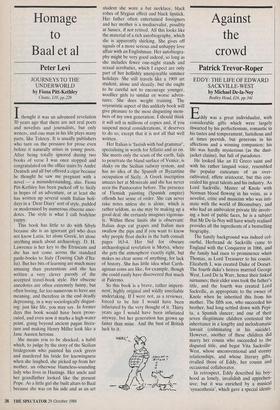Homage to Baal et al
Peter Levi
JOURNEYS TO THE UNDERWORLD by Fiona Pitt-Kethley
Chaim, f10, pp.226
Ithought it was an advanced revelation 30 years ago that there are not real poets and novelists and journalists, but only writers, and one man in his life plays many parts, like Tolstoy. It is usually publishers who turn on the pressure for prose even before it naturally arises in young poets. After being totally ignored during two books of verse I was once stopped and congratulated on the office stairs by Andre Deutsch and all but offered a cigar because he thought he saw me pregnant with a novel — a misunderstanding, alas. Fiona Pitt-Kethley has been packed off to Sicily in hopes of an adventure, or at least she has written up several south Italian holi- days in a 'Dear Diary' sort of style, padded or modernised by numerous obscene anec- dotes. The style is what I call bodyline
YuPPY• This book has little to do with Sibyls because she is an ignorant girl who does not know Latin, let alone Greek, let alone anything much about archaeology. D. H. Lawrence is her key to the Etruscans and she has not come across the standard guide-books to Italy (Touring Club d'Ita- fia). But her bits of learning are much more amusing than pretentious and she has written a very clever parody of the accepted travel-book style. Her obscene anecdotes are often extremely funny, but often boring, far too numerous to have any meaning, and therefore in the end deadly depressing, in a way sociologically disgust- ing: just like life, you may say. In former days this book would have been prose- cuted, and even now it marks a high-water point, going beyond ancient pagan litera- ture and making Henry Miller look like a Jane Austen heroine.
She means you to be shocked, a habit which, to judge by the story of the Sicilian bridegroom who painted his cock green and murdered his bride for knowingness when she laughed, she picked up from her mother, an otherwise blameless-sounding lady who lives in Hastings. Her uncle and her grandfather looked like the present Pope. As a little girl she built altars to Baal because she was on his side and as an art student she wore a bat necklace, black robes of Stygian effect and black lipstick. Her father often entertained foreigners and her mother is a mediaevalist, possibly at Sussex, if not retired. All this looks like the material of a rich autobiography, which she is apparently shirking. She gives off signals of a more serious and unhappy love affair with an Englishman. Her autobiogra- phy might be very good indeed, so long as she includes fewer one-night stands and sexual acrobatics, which I expect are only part of her hellishly unenjoyable summer holidays. She still travels like a 1969 art student, alone and sleazily, but she ought to be careful not to encourage younger, woollier girls to similar or worse adven- tures. She does weight training. The voyeuristic aspect of this unlikely book will give pleasure to the most disgusting mem- bers of my own generation. I should think it will sell in millions of copies and, if you suspend moral considerations, it deserves to do so, except that it is not all that well written.
Her Italian is lastish with bad grammar', specialising in words for fellatio and soon. She meets only the scum of the earth, fails to penetrate the bland surface of Venice, is shaky on the Sicilian railway system, and has no idea of the Spanish or Byzantine occupation of Sicily. A Greek inscription amazes her at Monreale and she has never seen the Pantocrator before. The presence of Flemish painting (Spanish empire) offends her sense of order. She can never take notes unless she is alone, which is rather seldom, so she may be making up a good deal: she certainly imagines vigorous- ly. Within these limits she is observant: Italian dogs eat grapes and Italian men swallow the pips and if you want to know why people float ducks in the bath consult pages 163-4. Her bid for obscure archaeological revelation is Motya, where she gets the atmosphere exactly right, but makes no clear sense of anything, for lack of history. She has little idea what Carth- aginian coins are like, for example, though she could easily have discovered that much at Palermo.
So this book is a brave, rather imperti- nent, highly original and wildly unreliable undertaking. If I were not, as a reviewer, forced to be fair I would have been infuriated by the very thought of it. Thirty years ago I would have been infuriated anyway, but her generation has grown up faster than mine. And the best of British luck to it.


























































 Previous page
Previous page